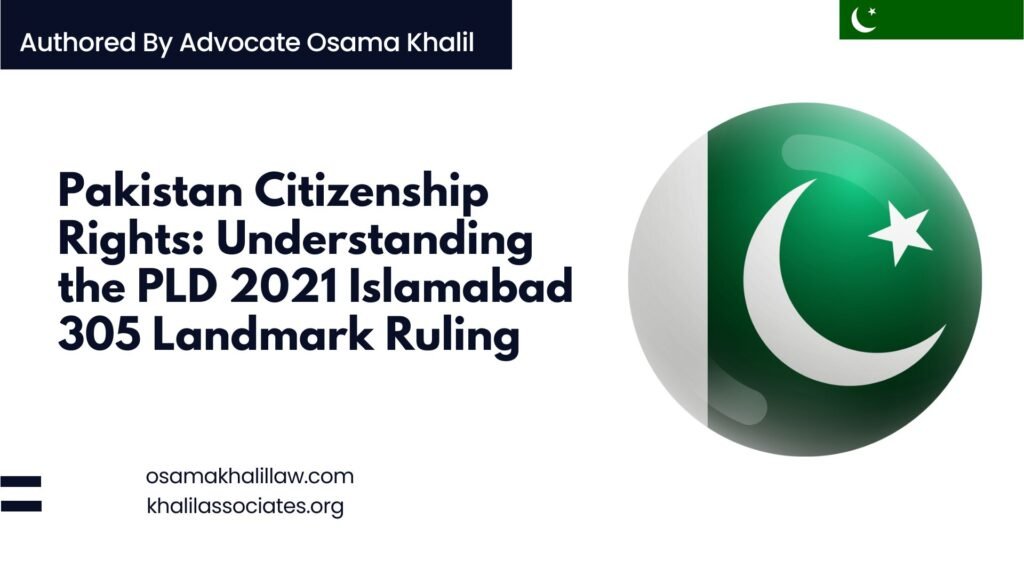
A recent and very important court decision reagrding right to nationality from Islamabad has made it absolutely clear that the government cannot take away your citizenship without following a strict legal process. This ruling, known as PLD 2021 Islamabad 305, stands as a powerful shield for every Pakistani citizen against arbitrary government action.
What Was the Case All About?
The case centered on a petitioner named Hafiz Hamdullah Saboor. Furthermore, NADRA, the national database authority, had cancelled his Computerized National Identity Card (CNIC). Consequently, the sole reason provided was a report from an intelligence agency claiming he was not a Pakistani citizen. Importantly, he had held a CNIC for decades, served as a Senator, and even had a son who was an officer in the Pakistan Army.
The Court’s Groundbreaking Decision on Citizenship
The Honorable Chief Justice Athar Minallah delivered a judgment that strongly reaffirmed the fundamental right to nationality. The court declared that NADRA had overstepped its legal authority. Essentially, NADRA’s job is to register citizens and issue cards, not to decide who is or is not a citizen of Pakistan.
Understanding Your Right to Nationality in Pakistan
The judgment provides immense clarity on the right to nationality. The court emphasized that citizenship is the most basic right because it is the foundation for all other rights. If you are stripped of your citizenship, you become stateless. This means you lose access to banks, jobs, healthcare, and property—your entire life comes to a halt.
How Does Pakistani Law Grant Citizenship?
The court explained the law simply. According to Section 4 of the Pakistan Citizenship Act, 1951, any person born in Pakistan after 1951 is automatically a citizen by birth. This is a birthright citizenship. The government bears the responsibility to prove otherwise in very specific, limited circumstances outlined in the law.
The Critical Difference Between NADRA and the Citizenship Law
This is a crucial distinction. The NADRA Ordinance gives the authority the power to issue ID cards. However, the Pakistan Citizenship Act is the supreme law that actually defines and governs all matters of citizenship. Therefore, NADRA cannot use its power to cancel a CNIC to effectively strip someone of their citizenship. That power rests only with the federal government following a detailed legal process.
The Severe Problem of Becoming Stateless
The court expressed deep concern about citizens being rendered stateless. Statelessness is a devastating condition where a person has no country to call their own. The ruling stated that the state must never adopt policies that could accidentally or intentionally make someone stateless. Protecting the right to nationality is a paramount duty.
Why the PEMRA Ban Was Also Illegal
In Hafiz Hamdullah’s case, after NADRA cancelled his card, the media regulator PEMRA also banned TV channels from inviting him to talk shows. The court declared this action an illegal misuse of power and a violation of the constitutional rights to freedom of speech and information.
The Final Outcome and Directives
The court allowed all petitions similar to Hafiz Hamdullah’s. It ordered NADRA to immediately restore the CNICs of all affected petitioners. The ruling firmly established that while the government can investigate citizenship, it must do so through the proper channels under the Citizenship Act, not through arbitrary NADRA actions based on secret reports.
What This Means for the Common Pakistani Citizen
This judgment is a monumental victory for citizen rights. It means that your right to nationality is secure. No government agency can recklessly cancel your identity card and plunge you into a legal void. The ruling ensures that every citizen’s dignity and fundamental rights are protected against overreach and that the due process of law will always be followed.
Legal Assistance
For professional legal guidance and support in immigration matters, you may contact:
Mr. Osama Khalil
Lawyer & Legal Consultant
📞 Phone: 0316-1829946
📧 Email: contact@osamakhalillaw.com | contact@khalilassociates.org
